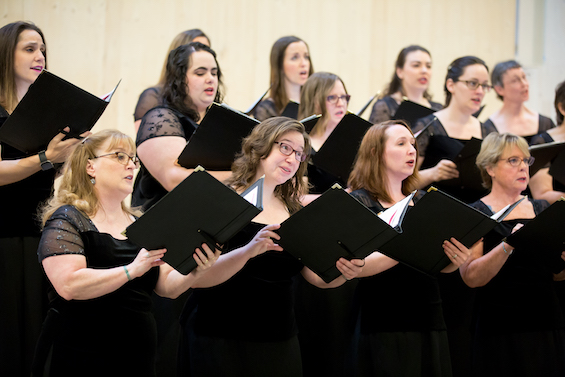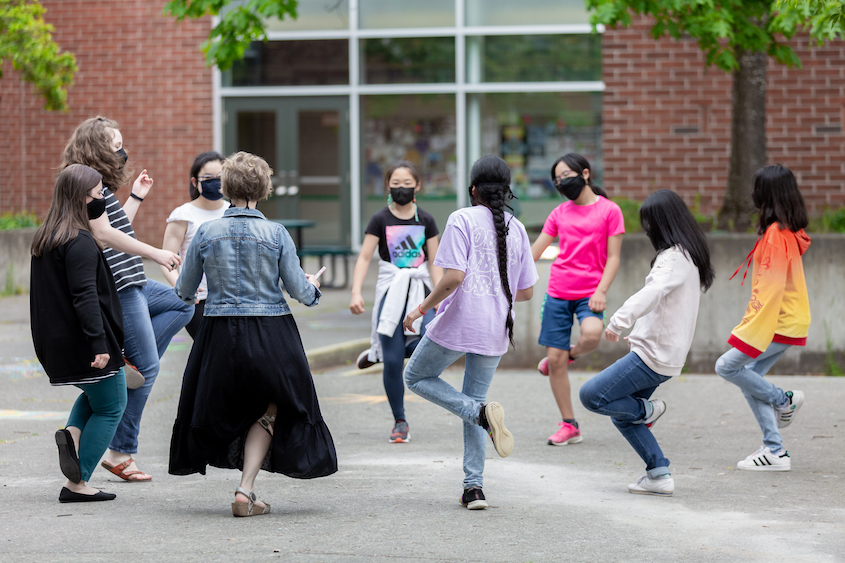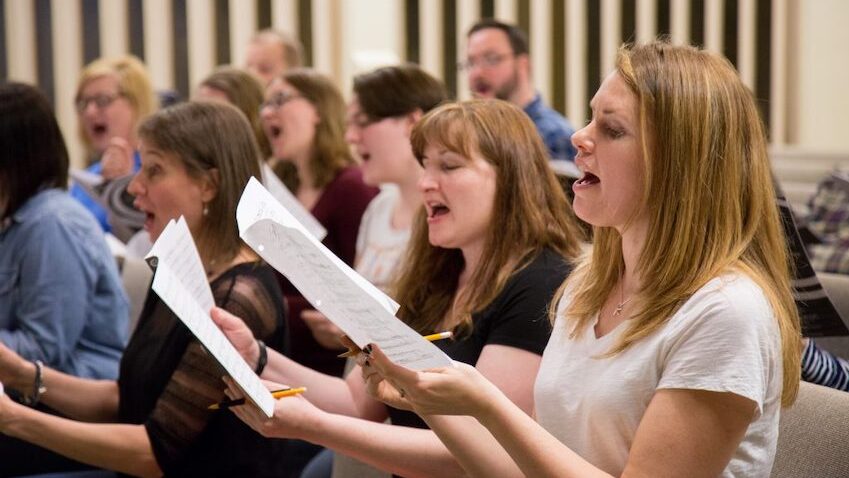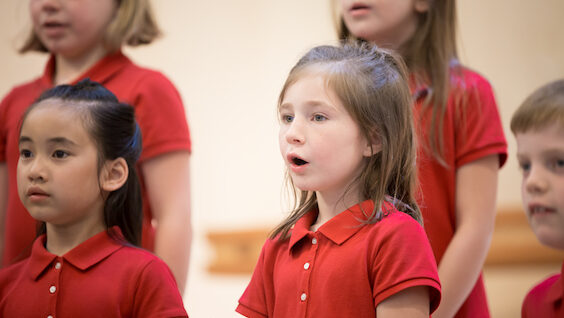What if we told you that it has been scientifically proven that choir positively affects a singer’s mind, body, and soul? We have collected a variety of published studies that investigate the ways in which singers of all ages benefit from participating in choir. We hope that as singers join us in song, they too can experience the life-long benefits of singing in choir.
Mental Health

Singing boosts your mood through the release of endorphins and oxytocin, helping significantly decrease anxiety and depression while increasing feelings of well-being and self-esteem.
[1] [2] [3]
Social Connectedness

Singing in a choir has shown to have a great effect on social cohesion, connection, and a feeling of belonging, even when compared to other group activities.
[4] [5]
Physical Health

Singing is a physical activity which has shown to increase cardio function, support lung function through elevated levels of oxygenation, and exercise abdominal muscles.
[6] [7] [8]
Cognitive Function

Music and singing stimulate memory, have a therapeutic effect on various cognitive diseases, and help increase attention.
[9] [10]
Language Development

Musical and linguistic skills are neurologically connected and exposure to the various elements of singing (pitch, melody, beat, rhythm) have positive effects on early language development as well as foreign language acquisition.
[11] [12] [13]
[1] Fancourt, Daisy, Katey Warran, Saoirse Finn, and Theresa Wiseman. “Psychosocial Singing Interventions for the Mental Health and Well-Being of Family Carers of Patients with Cancer: Results from a Longitudinal Controlled Study.” BMJ Open 9, no. 8 (2019). https://doi.org/10.1136/bmjopen-2018-026995.
[2] Fancourt, Daisy, Saoirse Finn, Katey Warran, and Theresa Wiseman. “Group Singing in Bereavement: Effects on Mental Health, Self-Efficacy, Self-Esteem and Well-Being.” BMJ Supportive & Palliative Care, 2019. https://doi.org/10.1136/bmjspcare-2018-001642.
[3] Shakespeare, Tom, and Alice Whieldon. “Sing Your Heart out: Community Singing as Part of Mental Health Recovery.” Medical Humanities 44, no. 3 (2017): 153–57. https://doi.org/10.1136/medhum-2017-011195.
[4] Pearce, Eiluned, Jacques Launay, and Robin I. Dunbar. “The Ice-Breaker Effect: Singing Mediates Fast Social Bonding.” Royal Society Open Science 2, no. 10 (2015): 150221. https://doi.org/10.1098/rsos.150221.
[5] Welch, Graham F., Evangelos Himonides, Jo Saunders, Ioulia Papageorgi, and Marc Sarazin. “Singing and Social Inclusion.” Frontiers in Psychology 5 (2014). https://doi.org/10.3389/fpsyg.2014.00803.
[6] Idrose, Alzamani Mohammad, Norsham Juliana, Sahar Azmani, Noor Anisah Yazit, Munawarah Silam Muslim, Mazdy Ismail, and Syazwan Nazri Amir. “Singing Improves Oxygen Saturation in Simulated High-Altitude Environment.” Journal of Voice 36, no. 3 (2022): 316–21. https://doi.org/10.1016/j.jvoice.2020.06.031.
[7] Branca, Jacopo Junio, Massimo Gulisano, Mario Marella, and Gabriele Mascherini. “Are Opera Singers Fit or Not?” Sustainability 12, no. 10 (2020): 4213. https://doi.org/10.3390/su12104213.
[8] Vickhoff, Björn, Helge Malmgren, Rickard Åström, Gunnar Nyberg, Seth-Reino Ekström, Mathias Engwall, Johan Snygg, Michael Nilsson, and Rebecka Jörnsten. “Music Structure Determines Heart Rate Variability of Singers.” Frontiers in Psychology 4 (2013). https://doi.org/10.3389/fpsyg.2013.00334.
[9] Osman, Sara Eldirdiry, Victoria Tischler, and Justine Schneider. “‘Singing for The Brain’: A Qualitative Study Exploring the Health and Well-Being Benefits of Singing for People with Dementia and Their Carers.” Dementia 15, no. 6 (2016): 1326–39. https://doi.org/10.1177/1471301214556291.
[10] Wan, Catherine Y., Theodor Rüber, Anja Hohmann, and Gottfried Schlaug. “The Therapeutic Effects of Singing in Neurological Disorders.” Music Perception 27, no. 4 (2010): 287–95. https://doi.org/10.1525/mp.2010.27.4.287.
[11] Politimou, Nina, Simone Dalla Bella, Nicolas Farrugia, and Fabia Franco. “Born to Speak and Sing: Musical Predictors of Language Development in Pre-Schoolers.” Frontiers in Psychology 10 (2019). https://doi.org/10.3389/fpsyg.2019.00948.
[12] Peretz I, Vuvan D, Lagrois MÉ, Armony JL. Neural overlap in processing music and speech. Philos Trans R Soc Lond B Biol Sci. 2015 Mar 19;370(1664):20140090. doi: 10.1098/rstb.2014.0090. PMID: 25646513; PMCID: PMC4321131.
[13] Ludke, K.M., Ferreira, F. & Overy, K. Singing can facilitate foreign language learning. Mem Cogn 42, 41–52 (2014). https://doi.org/10.3758/s13421-013-0342-5

